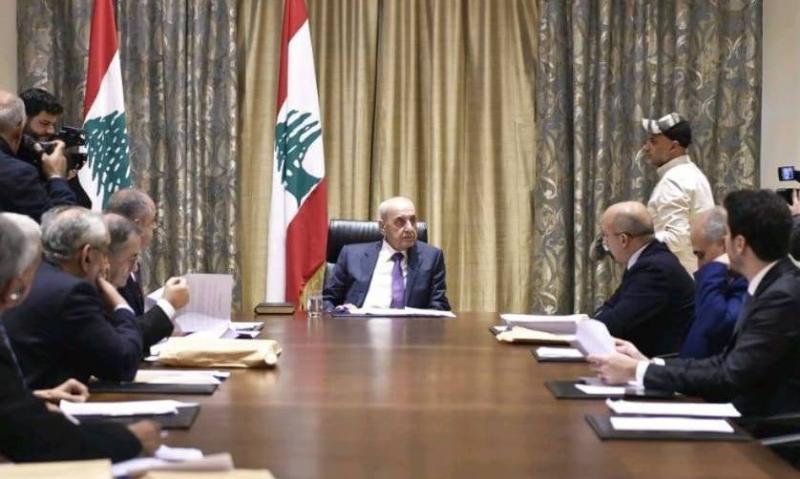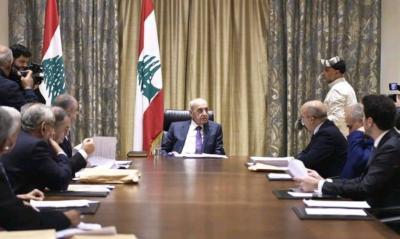The Speaker of the House, Nabih Berri, presided over a meeting of the House Bureau today, Monday, in Ain el-Tineh, with the attendance of Deputy Speaker Elias Bou Saab, secretaries of the House, and other members. After the meeting, Boussab stated, "Today, the House Bureau met under the chairmanship of President Nabih Berri to discuss the agenda for the General Assembly session scheduled for this week. A number of draft laws were reviewed, and it was agreed to include all projects and proposals completed by parliamentary committees. In addition to these, there are around 105 urgent repeated laws, but it is not the jurisdiction of the House Bureau to make decisions on them. There are laws that are similar to each other, and others that can be merged, but after the final agenda is issued, the selected urgent repeated laws will be appended to the 16 completed projects and proposals from parliamentary committees."
In response to a question regarding whether there was a plan to lure the Lebanese Forces to participate in the session through a flexible agenda, Boussab replied, "What I will say now represents my personal opinion only; the Parliament is not looking to lure anyone to legislative sessions. When there is a need to find solutions for citizens' issues at all levels, that should be the priority, and no one should feel embarrassed in any way. As for the embarrassment due to the extension, in my personal view, I do not wish for a parliament that struggles to meet regularly and legislate on all matters related to education, health, and public affairs, yet is only able to convene to extend for one or more individuals, while failing to meet to elect a President of the Republic. Hence, this is not what we depend on; this is my personal opinion. However, there is no embarrassment for anyone; there is a completed agenda in the committees, what is agreed upon in the session will be approved, and what is not will not be."
Regarding the urgent laws related to extending the army commander, Boussab stated, "We continue to say that there may still be a solution within the government. If that does not happen and we are forced to discuss a solution either in the government or in the council, then whatever needs to be done should be done, and we must take into account the objections that may arise, whether through a government decision or legislation from the House. A solution is still available to the government to achieve something legal; efforts are ongoing to reach the best solution. President Berri can prioritize urgent repeated laws on the agenda of the legislative session. It is necessary for us to study the laws and easily avoid objections against them."
Elias Mer also followed President Berri's discussions regarding the developments and the latest political and field updates in light of Israel's continued aggression against Gaza and Lebanon, during his meeting with former Deputy Prime Minister, Minister of Defense and Interior Elias Mer in the presence of MP Michel Mer. After the meeting, Mer stated, "Three topics were discussed today with President Berri. Certainly, the issue of the south and the Israeli violations being carried out on Lebanese territory, and the issue of the rules of engagement that we hope will remain and, unfortunately, we are at war, we hope it will not escalate further, as the situation cannot bear any more conflicts, nor can the country endure it, nor the economic and social conditions."
He added, "The second file is the vacancy in the leadership of the Lebanese Army, and as you know, I was in this ministry for nine years and I am aware of the danger of a vacuum, especially if it occurs in peacetime; how then if we are in a state of war? For this reason, President Berri confirmed that he will do what is necessary to prevent a vacuum in the Army's leadership."
He continued, "The third issue is the vacancy in the presidency; its major problem is the internal conflict, specifically the Christian-Christian conflict, which we all suffer from. President Berri also feels the pain of this. It should have been that in this situation, we are fortified with a President, a government, security agencies, and an army. Today, we are a country without a head."
He stated, "As for the south, and I speak from my personal opinion, certainly, the Israeli enemy, if circumstances permit it to expand the war to Lebanon, will not hesitate, because Netanyahu's government is in a major dilemma, and he is in an even greater dilemma; this is their rhetoric, which we hear in their media. He believes that expanding the scope of the battle will drag America and some countries into this conflict, leading to a regional struggle in the area, so that he can save himself and his government at this stage. For this reason, we must be very precise regarding this issue."
President Berri also received Andrew Barnes, the Australian Ambassador to Lebanon, where they discussed the general situation in Lebanon and the region and the bilateral relations between the two countries.




